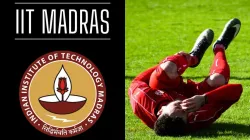New AI-based ultrasound scanner designed at IIT Madras to detect sports injury on-field
Researchers at the Indian Institute of Technology (IIT) Madras have developed a portable, indigenous Point-of-Care Ultrasound (POCUS) scanner capable of diagnosing sports injuries right on the field.

Researchers at the Indian Institute of Technology (IIT) Madras have developed a portable, indigenous Point-of-Care Ultrasound (POCUS) scanner which is capable of diagnosing sports injuries right on the field.
The POCUS, powered by Artificial Intelligence (AI) can potentially allow for on-field diagnosis of injuries, with immediate assessment of the extent of injury that will allow for medical professionals to take a call on whether to permit the sportsperson to continue playing.
The novel scanner has a wide range of applications in sports medicine. It has the benefits of safety (no radiation) and sufficient resolution compared to other modalities, said the team.
“We observed a current technological gap and a need for a point-of-care device for injury management and rehabilitation of elite athletes within routine training premises. A quick assessment for musculoskeletal on the field will help sports players get immediate attention and focus on recovery,” said Prof. Arun K. Thittai, Department of Applied Mechanics and Biomedical Engineering, IIT Madras.
With POCUS, ultrasound technology will be leveraged beyond the hospital setting, in sports medicine.
“We are currently exploring all options to take up POCUS for MSK imaging for commercial translation,” added Thittai, also a faculty member at the varsity’s Center of Excellence in Sports Science and Analytics (CESSA).
Established in 2019 with support from the government’s Institute of Eminence initiative, CESSA aims to become a global platform for fostering innovation in sports technology and delivering products and solutions to enhance athlete performance. The centre will also serve general fitness and health consumers.
Meanwhile, Thittai and the team aim to complete the product prototype development by 2024. They have also planned subsequent testing and collection of pilot data from the field in coordination with Sports Authorities.
ALSO READ: Google’s Circle to Search feature coming soon to more Android devices
Finally, Google plans to expand its most popular feature called 'Circle to Search'. This feature will soon be available for other Samsung and Pixel devices. Also, this feature will further support the newly launched Tecno V Fold 2.
ALSO READ: Smartphone speaker not working properly? 5 simple way to fix the problem
Here is a comprehensive guide on how to resolve your smartphone’s sound problems on both- iPhone and Android devices.